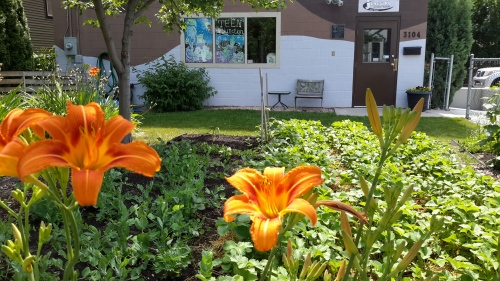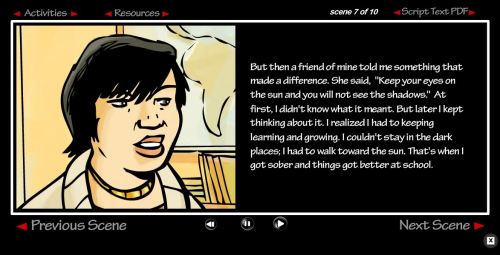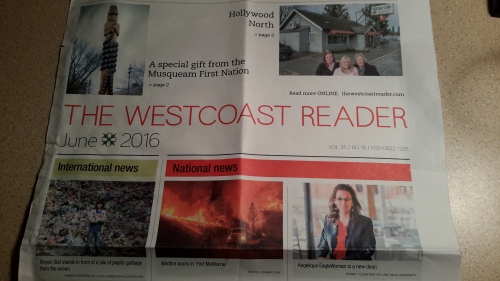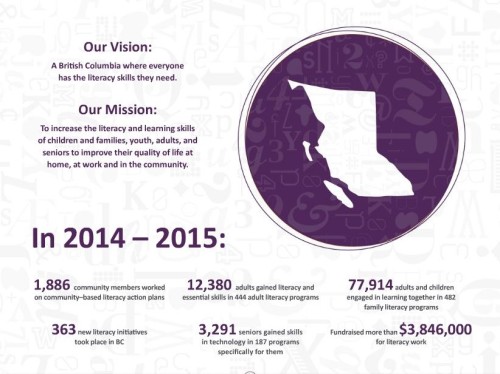
Kamloops, BC
I make a big jump from coast to interior with two flights – fly out of Haida Gwaii back to Vancouver airport, a five hour wait, then on to Kamloops in the BC interior where it’s suddenly 33C and only the start of summer. This is also the first time I’ll be driving on my own in Canada. Muttering reminders to ‘keep to the right’ and glad I paid extra for a GPS in the hire car, I carefully make my way across town to my motel accommodation.
Next morning finds me heading east on the Trans Canada Highway, following the South Thompson River River through the hills to Salmon Arm, then looping south towards the bottom of Arrow Lake. This detour gets me off the highway and gives me the chance to extend my conversations beyond my pre-planned meetings and into smaller centres. The drive takes me through the bread-basket of Canada, corn farms line the highway to Salmon Arm and fresh hay is being cut in the paddocks on the road south.
In this part of my trip I meet with a couple of local literacy coordinators and gain a better understanding of the BC literacy scene.
My contact in Salmon Arm is Darcy Calkins, Literacy Outreach Coordinator for the Literacy Alliance of the Shuswap Society (LASS), that covers the whole Shuswap school district – extending from Chase across to Sicamous and down to Armstrong. Her scope is whole of community, although much of her delivery focus is on family literacy with parents and young children.
Darcy also arranges programs for Seniors, where the focus is on mastering digital technology and learners usually bring their own device whether laptop, I-Pad or cellphone. Local Seniors Centres partner to provide premises, a paid local coordinator is possible with the help of government funding from Decoda and other fundraising, and individual learners are matched with volunteer tutors who have appropriate skills and knowledge e.g. one person may want to learn to use a mobile phone while someone else wants to master Photoshop. The pair meets for an hour a week for duration of the program, with learning focused on what the learner specifically wants. A typical program runs for six to eight weeks. Overall, each program is able to service 15 learners, three at a time, five times a day. Programs run twice a week during the day. As you might imagine, the biggest challenge is in sourcing enough volunteer tutors to meet the demand.
This is an effective program that produces a lot of positive feedback. The learners keep coming because they like meeting one on one and having the continuity of the same tutor throughout their program. The learning focuses on their specific needs around technology, and it’s free for them to access the program. At the end there’s always a celebration.
Later the same day I also speak with Wendy Aasen, coordinator of the Junction Literacy Centre in Vernon, which is a welcoming place featuring an edible garden in the front yard.

The welcoming yard of Vernon’s Junction Literacy Centre
The Junction Literacy Centre, operated by the Literacy and Youth Initiatives Society of the North Okanagan, works with community partners to identify and fill gaps in literacy services. Another arm of the Society operates Teen Junction, a Youth Centre for 13 to 18 year olds, in the same premises.
Again, the main volunteer program is based around computing and technology for adults, operating from the local Seniors’ Centre. The program addresses the issue of social isolation and sometimes student and tutor pairs maintain friendships after formal tutoring ends. A Saturday morning program was in such demand they had to turn people away.
The Society’s work and Literacy Junction have been operating for decades and they have hundreds of volunteers. Wendy’s been in her role for about 15 years and can tell me confidently that:
At the end of the day the face to face, real person is what people are looking for… Even in schools, it’s one on one, that’s where we get the gains.
I ask Wendy about literacy work with First Nations people but, although there’s definitely literacy needs, there’s little engagement, perhaps for reasons of culture or attitude but also because even Aboriginal children from the local schools can’t access Teen Junction programs as they have to bus back to their reserves.
There are similarities in the structure of the above regional community literacy organisations in that they are both community driven, have paid coordinators and sometimes other paid staff, but rely heavily on volunteers who are trained for up to around 20 hours and are then matched with a student, whom they then work with one to one for a couple of hours a week. Most of the volunteers are retirees and a focus of the training is teaching the volunteers to be accepting of the many barriers the students face and how sometimes this can mean students don’t show up at their arranged times and so on.
Finding and keeping enough volunteers to meet demand is one challenge; finding sufficient ongoing funding is another. Decoda Literacy Solutions, which I’ve mentioned in an earlier post, provide significant funding that comes from the government and is based on school districts. Other funds come from gaming grants – Darcy said they received $41,000 this way last year.
But Wendy’s team leads the way for local fundraising, with an annual Spelling Bee that’s run for years and has just raised $30,000 on a single night! The Spelling Bee is run quiz-style with entry for each table costing $1,000. Local businesses are happy to sponsor this by sending along a team of employees. At a later stop I met a member of the ‘Okanagan College Eggheads’, who’d won the Bee for four consecutive years but got pipped at the post by the Queen Beez in a 2016 tie-breaker. Nevertheless, he was proud to display his prize pen from a past year.

An Okanagan college Egghead remembers his moment (or year) of glory that helped raise funds for the Junction Literacy Centre.
Meeting such dedicated community literacy coordinators reminded me of Adult Learning Support, the community literacy organisation that I volunteered with and later worked for, in Nelson, New Zealand, prior to moving to Mudgee. It operates under the umbrella of Literacy Aotearoa, one of the leading literacy organisations in New Zealand.
Community literacy organisations could help fill the gap that I’ve noticed in New South Wales, where the emphasis is so much on accredited courses and work outcomes that literacy needs can easily get put into ‘too hard’ and ‘no time’ baskets.
The volunteer literacy tutors may have minimal training but they bring at least two other vital benefits to the table. First is the one to one learning opportunity, which allows for customization to meet specific learner needs, and second is the opportunity to develop strong relationships to support students’ learning. It’s well known that human relationship is at the heart of most literacy learning.
In the present NSW TAFE environment, the only way an adult learner is likely to have access to one to one learning is if a specific learning disability applies. Even one to one tutorial support for Aboriginal learners through the Aboriginal Education and Training Unit (AETU) is no longer possible. Funding cuts have done away with these services.
In fact, it’s so hard for me to believe that NSW has so little commitment to adult literacy, in that we don’t have (or barely have) volunteer literacy organisations, that I email the past president of the NSW Adult Literacy and Numeracy Council to check, but alas it’s true, there’s very little community literacy happening in NSW.
One exception is the Smith Family Home Tutor Scheme for AMEP (Australian Migrant Education Program) students, which is funded by the Australian Government Department of Education and Training. Volunteer tutors have been matched with English Language learners since 2003 under this program, though its only come to Mudgee and the Central West this year.
Other literacy support is provided through the libraries, though a web search implies this service is small and mainly aimed at children. More happens interstate – Tasmania has a bigger library literacy program, called LINC, and Western Australia has a community scheme called Read Write Now.
As I reflect on my Canada meetings and the variety of programs, colleges and other organisations that I’ve encountered, it becomes obvious that almost every one of the BC programs have been underpinned with volunteer tutors. The University of Vancouver Island used them and I’ve read that the early child care course on Haida Gwaii was run with the support of volunteers.
Why doesn’t NSW make more use of literacy volunteers? Presumably it’s because tutors who’ve only been trained 15 or 20 hours are not in the same league as professional teachers and perhaps there’s union opposition. However, if volunteers supplement the service provided by teachers and provide the support that literacy learners need, and if the community ethos changes to value literacy more, then I’ll welcome volunteers with open arms.
In closing, it’s worth mentioning that Decoda Literacy Solutions doesn’t only supply funding, they also provide tutor training, and also produce and distribute a wide range of resources. I once found this sensitive animated resource for students who have suffered violence on the web, and saw that Decoda BC was a partner in its creation.

A scene from the animated Learning and Violence resource
Another good resource from Decoda is The Westcoast Reader, which contains selected and re-written newspaper articles that are graded for readers of different levels.

This is how Decoda describes themselves:
Decoda Literacy Solutions is the only province-wide literacy organization in British Columbia. Providing resources, training and funds, Decoda supports community-based literacy programs and initiatives in over 400 communities across BC. Decoda supports children and families, youth, adults, Aboriginal and immigrant communities in an effort to build strong individuals, strong families and strong communities. As a non-profit organization, Decoda relies on the generosity of individual donors, corporate partners and government to fund literacy work.

Decoda’s vision, mission and key statistics, as shown in their 2014-15 annual report (follow link below to access the full report)
Finally, here is a link to a Decoda publication that provides a good summary of adult learning and using volunteers and partnerships to support literacy development.
Good read. Interesting comparisons. Hopefully there will be interested and pro-active listeners when you report back home, Berni.
LikeLiked by 1 person
Thanks pippatassie, there are a few themes emerging now, that will form the basis of my recommendations in my final, summary report.
LikeLike